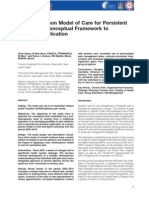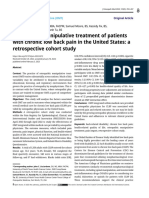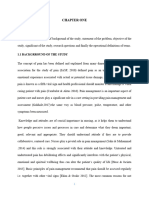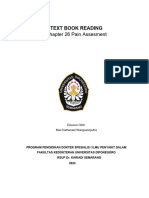Draft Rol
Draft Rol
Uploaded by
rosemarytimiyaCopyright:
Available Formats
Draft Rol
Draft Rol
Uploaded by
rosemarytimiyaOriginal Title
Copyright
Available Formats
Share this document
Did you find this document useful?
Is this content inappropriate?
Copyright:
Available Formats
Draft Rol
Draft Rol
Uploaded by
rosemarytimiyaCopyright:
Available Formats
Topic: - Impact of untreated pain on rehabilitation outcomes in
critical care patients.
Introduction
Despite several decades of research, pain is still a significant problem for critically ill
patients throughout their stay in the intensive care unit (ICU). Inaccurate pain
assessment and the resulting inadequate treatment of pain in critically ill adults can
have significant physiological and psychological consequences. Under diagnosed pain
has been linked to a number of adverse outcomes including increased infection rate,
prolonged mechanical ventilation, hemodynamic derangements, delirium, and
compromised immunity .( K., Pasero C., Li Puntillo D., et al. Evaluation of pain in ICU
patients. Chest. 2009;135). Appropriate pain management depends on the systematic and
comprehensive assessment of pain to guide decision-making regarding titration of
analgesia and administration of “as needed” medications (Kwekkeboom K. L., Herr K.
Assessment of pain in the critically ill. Critical Care Nursing Clinics of North America. 2001;13).
Background
More points to be added.
Methods
For this literature review, relevant literature published between 2009 and 2024 was
searched using various databases, including CINAHL, MEDLINE, PsycINFO. The search
terms included “intensive care unit”, “Critical care unit”, “ Rehabilitation”, “Pain”,”
Untreated pain”, “untreated pain”, “Ventilated patients” “Intubated patients”, “Patient
outcome”. The search was limited to full text pdf articles which were published in
English. Both quantitative and qualitative studies were considered. Studies were
extracted according to the Preferred Reporting Items for Systematic Reviews and Meta
analyses (PRISMA) guidelines. A quality assessment was under taken for the each of the
included studies using Critical Appraisal Skills Programme (CASP) checklists.
Results
More points to be added.
Preferred reporting items for systematic reviews and meta analysis
(PRISMA)
More points to be added.
Impact of untreated pain on functional recovery
Untreated pain in the intensive care unit (ICU) is a significant concern,
impacting functional recovery, rehabilitation outcomes, and long-term quality of life for
ICU survivors. Factors contributing to untreated pain include underutilization of
analgesics, inadequate dosing, fear of opioid-related adverse effects, challenges in pain
assessment, and barriers to communication between patients and healthcare providers.
Untreated pain can lead to muscle weakness, delayed rehabilitation initiation, impaired
mobility, reduced rehabilitation adhesion, prolonged hospital stays, and long-term
functional decline and disability. Chronic pain syndromes, psychological distress, sleep
disturbances, fatigue, and impaired social functioning can also be developed in ICU
survivors.
To address untreated pain, comprehensive pain assessment, multimodal analgesia, and
interdisciplinary collaboration are essential strategies. Implementing systematic
approaches to pain assessment, utilizing multimodal analgesic regimens, and facilitating
interdisciplinary collaboration among healthcare providers can optimize pain control
and promote early mobilization and rehabilitation. By optimizing pain management
throughout the continuum of critical illness and recovery, healthcare providers can
enhance patient outcomes, improve quality of life, and promote long-term recovery and
well-being among ICU survivors. (Puntillo & Naidu, 2016).
More points to be added
Impact of untreated pain on rehabilitation outcomes
More points to be added
Impact of untreated pain on long term quality of life
More points to be added
Strategies to address untreated pain in critical care patients
More points to be added
Conclusion
More points to be added
References
More points to be added
You might also like
- Ashley 4020 Assessment 2Document7 pagesAshley 4020 Assessment 2Japheth OlimaNo ratings yet
- Manual Technical Hitachi Zaxis zx110 120 130lcn Hydraulic Excavators Safety Operation Troubleshooting Systems PDFDocument447 pagesManual Technical Hitachi Zaxis zx110 120 130lcn Hydraulic Excavators Safety Operation Troubleshooting Systems PDFRoyen94% (48)
- Short Notes For CSS General Science and Ability Paper PDFDocument108 pagesShort Notes For CSS General Science and Ability Paper PDFAbdullah Khan50% (4)
- Postoperative Pain Management - ESRA GuidelinesDocument34 pagesPostoperative Pain Management - ESRA GuidelinesAlex Apsokardos100% (1)
- Draft Rol-1Document3 pagesDraft Rol-1rosemarytimiyaNo ratings yet
- Artikel Pain MenegementDocument19 pagesArtikel Pain Menegementrizki heriyadiNo ratings yet
- Ashley 4020 Assessment 1.editedDocument7 pagesAshley 4020 Assessment 1.editedJapheth OlimaNo ratings yet
- ebp paper copyDocument9 pagesebp paper copyjpq2qw285mNo ratings yet
- A Whole-Person Model of Care For Persistent Pain: From Conceptual Framework To Practical ApplicationDocument12 pagesA Whole-Person Model of Care For Persistent Pain: From Conceptual Framework To Practical Applicationapi-109305792No ratings yet
- Preoperative Pain Management Education An Evidence-Based Practice ProjectDocument8 pagesPreoperative Pain Management Education An Evidence-Based Practice Projectfachrudin arNo ratings yet
- Outcome Measures For Pain After Surgery - Gordon-ZaslanskyDocument5 pagesOutcome Measures For Pain After Surgery - Gordon-ZaslanskyeryxspNo ratings yet
- Pain Assessment and Reassessment Documentation Improvements in MeDocument47 pagesPain Assessment and Reassessment Documentation Improvements in Mepaulsgraphics17No ratings yet
- Valle Rand 2011Document13 pagesValle Rand 2011Azhari BaedlawiNo ratings yet
- Senior Thesis PaperDocument19 pagesSenior Thesis Paperapi-285722095No ratings yet
- 2009;12;345-360-Systematic Review of Intrathecal InfusionDocument16 pages2009;12;345-360-Systematic Review of Intrathecal InfusionLarissa MacielNo ratings yet
- Perceptimi I Profesionisteve Shendetesor Per Dhimbjen PostoperativeDocument3 pagesPerceptimi I Profesionisteve Shendetesor Per Dhimbjen PostoperativeAgron BytyqiNo ratings yet
- Pain AssessentDocument9 pagesPain AssessentJoanna RachelNo ratings yet
- British Journal of Surgery - 2020 - Small - Acute Postoperative Pain ManagementDocument11 pagesBritish Journal of Surgery - 2020 - Small - Acute Postoperative Pain ManagementNurlinaNo ratings yet
- The Effectiveness of A Multidisciplinary Pain Management Programme Managing Chronic PainDocument11 pagesThe Effectiveness of A Multidisciplinary Pain Management Programme Managing Chronic PainAzucenaNo ratings yet
- Order 863008491 - LOUIS VUITTONDocument11 pagesOrder 863008491 - LOUIS VUITTONHum NjorogeNo ratings yet
- Literature Review Pain AssessmentDocument8 pagesLiterature Review Pain Assessmentc5r0xg9z100% (1)
- Kuesioner American Pain SocietyDocument15 pagesKuesioner American Pain SocietyNamira Firdha KNo ratings yet
- Moore (2014) - The Costs and Consequences of Adequately Managed Chronic Non-Cancer Pain and Chronic Neuropathic PainDocument16 pagesMoore (2014) - The Costs and Consequences of Adequately Managed Chronic Non-Cancer Pain and Chronic Neuropathic PainLuciana AraújoNo ratings yet
- The Argument For Enhanced Use of Complementary and Alternative Therapies in Chronic Pain ManagementDocument4 pagesThe Argument For Enhanced Use of Complementary and Alternative Therapies in Chronic Pain ManagementquadrospauloNo ratings yet
- NS11530 Author Proof 002Document10 pagesNS11530 Author Proof 002ugwuobachinaemeremNo ratings yet
- Bjs 11477Document12 pagesBjs 11477angelNo ratings yet
- Principles of Acute Pain ManagementDocument26 pagesPrinciples of Acute Pain ManagementNasir Jufri100% (1)
- Efficacy Tolerability and Safety of Nonph Therapies For Chronic Pain CAMDocument15 pagesEfficacy Tolerability and Safety of Nonph Therapies For Chronic Pain CAMMiguel TrillosNo ratings yet
- Pain MGMT Best Practices Draft Final Report 05062019Document114 pagesPain MGMT Best Practices Draft Final Report 05062019MrEnttNo ratings yet
- Patients' Perception of Acute and Chronic Pain and Their Satisfaction With Care at The General Hospital DoualaDocument8 pagesPatients' Perception of Acute and Chronic Pain and Their Satisfaction With Care at The General Hospital DoualaEditor IJTSRDNo ratings yet
- Consideration of Pain Felt by Patients in The ICU: Commentary Open AccessDocument2 pagesConsideration of Pain Felt by Patients in The ICU: Commentary Open AccessevernotegeniusNo ratings yet
- Rosenquist 2003Document10 pagesRosenquist 2003gustavo.gamoNo ratings yet
- Multidisciplinary Treatment Review 2008Document9 pagesMultidisciplinary Treatment Review 2008Dieter-No ratings yet
- Akpanudoh 1,2,3 Last WorkDocument51 pagesAkpanudoh 1,2,3 Last Workessiendaniel001No ratings yet
- OMT DLC Cohort Licciardone 2023Document9 pagesOMT DLC Cohort Licciardone 2023CarolineRazeraNo ratings yet
- Heapy 2016Document13 pagesHeapy 2016Anonymous FZTQ6OVHNo ratings yet
- Clinical GuidelinesDocument7 pagesClinical GuidelinesGloriaNo ratings yet
- British Journal of Surgery - 2020 - Small - Acute Postoperative Pain ManagementDocument11 pagesBritish Journal of Surgery - 2020 - Small - Acute Postoperative Pain ManagementkyleNo ratings yet
- Arfan Nursing EducationDocument13 pagesArfan Nursing EducationwahyuningsihhusainNo ratings yet
- Using MBCT in A Chronic Pain Setting: A Qualitative Analysis of Participants' ExperiencesDocument11 pagesUsing MBCT in A Chronic Pain Setting: A Qualitative Analysis of Participants' ExperiencesJay JalaliNo ratings yet
- Managing Pain in Intensive Care Units: EpidemiologyDocument9 pagesManaging Pain in Intensive Care Units: EpidemiologyMega SudibiaNo ratings yet
- Recommended Guidelines For Pain Management Programmes For AdultsDocument32 pagesRecommended Guidelines For Pain Management Programmes For AdultsrohishatulilmiyahNo ratings yet
- Relationships Between Patient-Related Attitudinal Barriers, Analgesic Adherence and Pain Relief in Chinese Cancer InpatientsDocument7 pagesRelationships Between Patient-Related Attitudinal Barriers, Analgesic Adherence and Pain Relief in Chinese Cancer Inpatientsntquang.dhktyddnNo ratings yet
- Chronic Pain Can Be A Multisystem Disease Nov 23 2013Document3 pagesChronic Pain Can Be A Multisystem Disease Nov 23 2013lauraNo ratings yet
- Artículo 3 - Manipulacion and Movilzacion para Dolor Lumbar CrónicoDocument25 pagesArtículo 3 - Manipulacion and Movilzacion para Dolor Lumbar CrónicoNicolás Espinoza ConstanzoNo ratings yet
- Musculoskeletal Science and PracticeDocument6 pagesMusculoskeletal Science and PracticeAfnes AstrianiNo ratings yet
- Chapter 1-5Document46 pagesChapter 1-5Suleiman ZakarNo ratings yet
- Pharmacological Manage of Persistent Pain Older 1Document22 pagesPharmacological Manage of Persistent Pain Older 1Borja Carreño MarambioNo ratings yet
- NIH Public Access: Author ManuscriptDocument24 pagesNIH Public Access: Author ManuscriptrenatanurulsNo ratings yet
- A Plan To Study For The TruthDocument5 pagesA Plan To Study For The TruthNdolo MosesNo ratings yet
- Pain Definition and The Biopsychosocial Model With Its ComponentsDocument4 pagesPain Definition and The Biopsychosocial Model With Its ComponentskaterinaNo ratings yet
- TBR English - Max Nathanael W. - Pain Assesment (Edit)Document12 pagesTBR English - Max Nathanael W. - Pain Assesment (Edit)Max NathanaelNo ratings yet
- Manipulation and Mobilization For Treating Chronic Low Back Pain: A Systematic Review and Meta-AnalysisDocument14 pagesManipulation and Mobilization For Treating Chronic Low Back Pain: A Systematic Review and Meta-AnalysisradenbagasNo ratings yet
- Pediatric Oncology: Managing Pain at The End of Life: Key PointsDocument20 pagesPediatric Oncology: Managing Pain at The End of Life: Key PointsAlexander Benavides RamirezNo ratings yet
- Artikel Nyeri IngDocument7 pagesArtikel Nyeri IngPuspita Sari FiazNo ratings yet
- Posteoperative Embase RevisedDocument21 pagesPosteoperative Embase Revisedumair hassanNo ratings yet
- 2.chronicback PainDocument9 pages2.chronicback PainRiantiara PutrizaNo ratings yet
- Estudio Efectividad Tto en Primaria Dolor CronicoDocument18 pagesEstudio Efectividad Tto en Primaria Dolor CronicoMaría José LópezNo ratings yet
- Assessment of Pain Management in Anaesthesia Practice among Nurse AnaesthetistsFrom EverandAssessment of Pain Management in Anaesthesia Practice among Nurse AnaesthetistsNo ratings yet
- Meeting the Needs of Older Adults with Serious Illness: Challenges and Opportunities in the Age of Health Care ReformFrom EverandMeeting the Needs of Older Adults with Serious Illness: Challenges and Opportunities in the Age of Health Care ReformAmy S. KelleyNo ratings yet
- Pain Management Nursing: Scope and Standards of Practice, 2nd EditionFrom EverandPain Management Nursing: Scope and Standards of Practice, 2nd EditionRating: 5 out of 5 stars5/5 (1)
- Target 1000 BookletDocument19 pagesTarget 1000 BookletLinc CentreNo ratings yet
- Effect of Antidepressant Medications On Semen Parameters and Male FertilityDocument8 pagesEffect of Antidepressant Medications On Semen Parameters and Male FertilitySueNo ratings yet
- Mole Concept Pre Vos Year QuestionDocument22 pagesMole Concept Pre Vos Year QuestionMeenakshi MadanNo ratings yet
- Bihar Land Conversion ApplicationDocument1 pageBihar Land Conversion ApplicationNikhil KumarNo ratings yet
- HRM Term Report 2Document18 pagesHRM Term Report 2Ume RubabNo ratings yet
- Kulpak RSAL - Kesehatan Penyelaman KPLPDocument49 pagesKulpak RSAL - Kesehatan Penyelaman KPLPNabilaNo ratings yet
- ADNOC DALMA Project HSE Engineer Interview Questions (DELMA HSEE)Document7 pagesADNOC DALMA Project HSE Engineer Interview Questions (DELMA HSEE)tameem99No ratings yet
- RTD Coffee in The Philippines PDFDocument7 pagesRTD Coffee in The Philippines PDFMarcus AmabaNo ratings yet
- 186843-Article Text-474997-1-10-20190525Document15 pages186843-Article Text-474997-1-10-20190525Firomsa IbrahimNo ratings yet
- ADIP Scheme: (Scheme of Assistance To Disabled Persons For Purchase/Fitting of Aids/Appliances)Document5 pagesADIP Scheme: (Scheme of Assistance To Disabled Persons For Purchase/Fitting of Aids/Appliances)buva_86No ratings yet
- Daftar Sediaan Cream Instalasi Farmasi Rs Harapan Bunda NO CreamDocument5 pagesDaftar Sediaan Cream Instalasi Farmasi Rs Harapan Bunda NO CreamTriyoko Septio MNo ratings yet
- A2000 Multifunctional Power Meter: Applications Applicable Regulations and StandardsDocument8 pagesA2000 Multifunctional Power Meter: Applications Applicable Regulations and Standardschock channel 19No ratings yet
- COSH - Introduction (Synerquest) - CompressedDocument28 pagesCOSH - Introduction (Synerquest) - CompressedCarlo Thon GesalanNo ratings yet
- Chemical Equilbirum 8Document6 pagesChemical Equilbirum 8Charlotte HooperNo ratings yet
- Exam ScheduleDocument15 pagesExam ScheduleStarLink1No ratings yet
- Unit 3 - Izone Khoá 5.6. Listening and VocabDocument17 pagesUnit 3 - Izone Khoá 5.6. Listening and VocabTạ Huy Hoàng100% (1)
- Indian Association of Physics Teachers: National Standard Examination in Junior Science 2013-2014Document14 pagesIndian Association of Physics Teachers: National Standard Examination in Junior Science 2013-2014DivyanshNo ratings yet
- "Kabihug": This Study Resource WasDocument4 pages"Kabihug": This Study Resource WasAnabelle M. BalanzaNo ratings yet
- API-571 Reference CardDocument7 pagesAPI-571 Reference CardLaith Salman100% (1)
- Pre-Medical: Chemistry: Exercise-IDocument6 pagesPre-Medical: Chemistry: Exercise-IAhkil NandaNo ratings yet
- Avantis 70 HV - Aluminium Windows With Hidden Vent - Sapa Building SystemDocument12 pagesAvantis 70 HV - Aluminium Windows With Hidden Vent - Sapa Building SystemSapa Building SystemNo ratings yet
- Bectu Tax Guidance FinalDocument44 pagesBectu Tax Guidance FinalpaulNo ratings yet
- Match The Jobs With The Correct PicturesDocument1 pageMatch The Jobs With The Correct PicturesAna LourençoNo ratings yet
- Opioid Induced HyperalgesiaDocument39 pagesOpioid Induced HyperalgesiaAnonymous XEbh4UxfNo ratings yet
- Continental A65 Aircraft Engine SpecsDocument12 pagesContinental A65 Aircraft Engine SpecsAIRCRAFTS90% (10)
- Thesis On Newcastle Disease VirusDocument4 pagesThesis On Newcastle Disease Virusmilespriarsaltlakecity100% (2)
- 5.2.4: Network Infrastructure Administration: Handbook of Operating ProceduresDocument2 pages5.2.4: Network Infrastructure Administration: Handbook of Operating ProcedureslktedNo ratings yet
- How To Save Income Tax in IndiaDocument6 pagesHow To Save Income Tax in IndiaSameerNo ratings yet

























































































